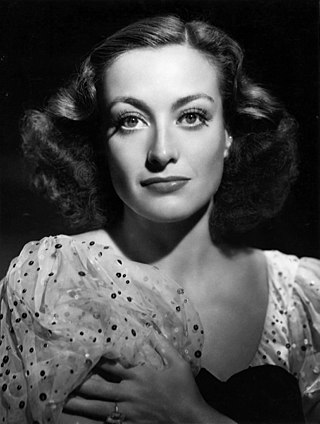
Joan Crawford was an American actress. She started her career as a dancer in traveling theatrical companies before debuting on Broadway. Crawford was signed to a motion picture contract by Metro-Goldwyn-Mayer in 1925. Initially frustrated by the size and quality of her parts, Crawford launched a publicity campaign and built an image as a nationally known flapper by the end of the 1920s. By the 1930s, Crawford's fame rivaled MGM colleagues Norma Shearer and Greta Garbo. Crawford often played hardworking young women who find romance and financial success. These "rags-to-riches" stories were well received by Depression-era audiences and were popular with women. Crawford became one of Hollywood's most prominent movie stars and one of the highest paid women in the United States, but her films began losing money. By the end of the 1930s, she was labeled "box office poison".
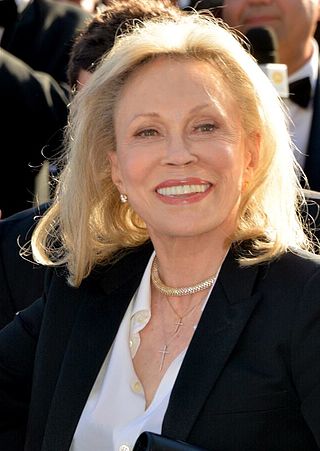
Dorothy Faye Dunaway is an American actress. She is the recipient of many accolades, including an Academy Award, a Primetime Emmy Award, three Golden Globe Awards, and a BAFTA Award. In 2011, the government of France made her an Officer of the Order of Arts and Letters.

Mommie Dearest is a memoir and exposé written by Christina Crawford, the adopted daughter of Academy Award winning actress Joan Crawford. Published in 1978, it attracted much controversy for its portrayal of Joan Crawford as a cruel, unbalanced, and alcoholic mother, with Crawford's other twin daughters, household staff, and family friends denouncing it as sensationalized fiction. It was turned into a 1981 film of the same title starring Faye Dunaway.
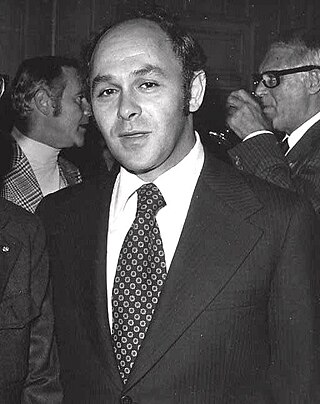
Frank Yablans was an American studio executive, film producer, and screenwriter. Yablans served as an executive at Paramount Pictures, including President of the studio, in the 1960s and 1970s.

Frank Joseph Perry Jr. was an American stage director and filmmaker. His 1962 independent film David and Lisa earned an Academy Award nomination for Best Director and Best Adapted Screenplay. The couple collaborated on five more films, including The Swimmer, Diary of a Mad Housewife, and the Emmy Award–nominated A Christmas Memory, based on a short story by Truman Capote. Perry went on to form Corsair Pictures, privately financed by United Artists Theatres, which produced Miss Firecracker and A Shock to the System, then folded. His later films include Mommie Dearest and the documentary On the Bridge, about his battle with prostate cancer.

Torch Song is a 1953 American Technicolor musical drama film distributed by Metro-Goldwyn-Mayer and starring Joan Crawford and Michael Wilding in a story about a Broadway star and her blind rehearsal pianist. The screenplay by John Michael Hayes and Jan Lustig was based upon the story "Why Should I Cry?" by I.A.R. Wylie in a 1949 issue of The Saturday Evening Post. The film was directed by Charles Walters and produced by Sidney Franklin, Henry Berman and Charles Schnee. Crawford's singing voice was dubbed by India Adams.
Abraham Lincoln Polonsky was an American film director, screenwriter, essayist and novelist. He was nominated for an Academy Award for Best Original Screenplay for Body and Soul but in the early 1950s was blacklisted by the Hollywood movie studios, after refusing to testify at congressional hearings of the House Un-American Activities Committee, in the midst of the McCarthy era.

Christina Crawford is an American author and actress, best known for her 1978 memoir and exposé, Mommie Dearest, which described the alleged abuse she was subjected to by her adoptive mother, film star Joan Crawford.
Diana Scarwid is an American actress. She is best known for her portrayal of Christina Crawford in Mommie Dearest (1981). She received nominations for the Academy Award for Best Supporting Actress for Inside Moves (1980), and the Primetime Emmy Award for Outstanding Supporting Actress in a Limited Series or Movie for Truman (1995).
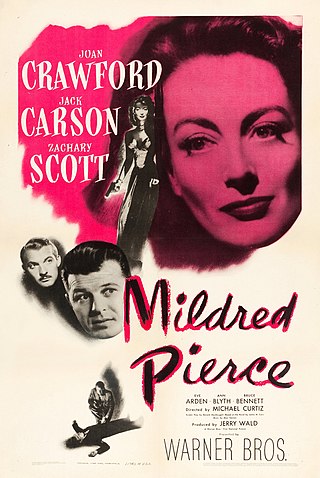
Mildred Pierce is a 1945 American melodrama/film noir directed by Michael Curtiz and starring Joan Crawford, Jack Carson, and Zachary Scott, also featuring Eve Arden, Ann Blyth, and Bruce Bennett. Based on the 1941 novel by James M. Cain, this was Crawford's first starring role for Warner Bros., after leaving Metro-Goldwyn-Mayer, and she won the Academy Award for Best Actress. In 1996, Mildred Pierce was deemed "culturally, historically, or aesthetically significant" and selected for preservation in the United States Library of Congress National Film Registry.
Mara Hobel is an American actress. She is best known for her portrayal of young Christina Crawford in the film Mommie Dearest, starring Faye Dunaway. She garnered 2 Razzie nominations for her performance. She also portrayed the crazed tap-dancing daughter Gay in the legendary Broadway bomb, Moose Murders, which opened and closed on the same night in 1983.

The Disappearance of Aimee is a 1976 American made-for-television biographical drama film directed by Anthony Harvey and starring Faye Dunaway as the evangelist Aimee Semple McPherson, co-starring Bette Davis, James Sloyan and James Woods. The film originally premiered as a presentation of Hallmark Hall of Fame on NBC on November 17, 1976.
Rutanya Alda is a Latvian-American actress. She began her career in the late 1960s, and went on to have supporting parts in The Deer Hunter (1978), Rocky II (1979), and Mommie Dearest (1981). She also appeared in a lead role in the horror films Amityville II: The Possession and Girls Nite Out.
Robert Getchell was an American screenwriter. Getchell wrote the 1974 film Alice Doesn't Live Here Anymore and created the sitcom based on that film, Alice. He was nominated for an Academy Award for his screenplays for both Alice Doesn't Live Here Anymore and the subsequent Bound for Glory.
Michael Edwards is an American actor and model.

The Wicked Lady is a 1983 British-American period drama directed by Michael Winner and starring Faye Dunaway, Alan Bates, John Gielgud, Denholm Elliott, and Hugh Millais. It was screened out of competition at the 1983 Cannes Film Festival. It is a remake of the 1945 film of the same name, which was one of the popular series of Gainsborough melodramas.
Dorothy Bishop is an American variety entertainer, singer and comedian from New York City who is best known for The Dozen Divas Show, a cabaret act in which she performs celebrity impressions of singers such as Cher, Liza Minnelli, Madonna, Lady Gaga, Stevie Nicks, Renée Fleming, Barbra Streisand, Judy Garland, Kristin Chenoweth and Shirley Bassey as well as political figures like Hillary Clinton, Elizabeth Warren and Marianne Williamson.
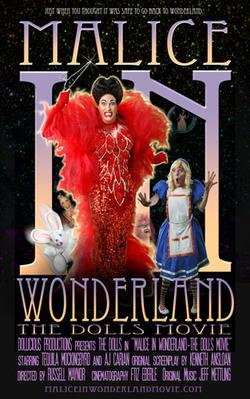
Malice in Wonderland: The Dolls Movie is a 2010 drag comedy produced by Delicious Productions LLC, directed by Russell Maynor, written by Kenneth Ansloan and performed by The Dolls, the notorious drag troupe from Albuquerque, New Mexico. It is a psychedelic mash-up of Lewis Carroll's Alice's Adventures in Wonderland and Mommie Dearest, with additional parody references to The Wizard of Oz, Mary Poppins, A Clockwork Orange and numerous other films. It is based on the original 2008 stage show of the same name and performed by The Dolls.

Anita Khalatbari is an American journalist, news anchor, reporter, actress, TV show host of Iranian descent. She was brought up and educated in Britain. Her great-grandfather Sepahdar A'zam was of the Royal Khalatbari family and served as Prime Minister for 4 terms (1909). With the advent of the Pahlavi dynasty and the Reza Khans, imposed by the British in the 1920s, Sepahdar Azam was placed under increased political pressure. Much of his property was seized by the new government in an attempt to control his wealth and his power. Sepahdar Azam committed suicide.

Faye Dunaway is an American actress who appeared in over seventy films, thirty television shows, thirteen plays and two music videos. Regarded as one of the greatest actresses of her generation, she was one of the leading actresses during the golden age of New Hollywood. After her film debut The Happening, she starred in the gangster film Bonnie and Clyde, in which she was nominated for the Academy Award for Best Actress. She starred with Steve McQueen in The Thomas Crown Affair (1968). In 1969, she co-starred with Kirk Douglas in Elia Kazan's drama The Arrangement. The following year, she starred with Dustin Hoffman in Little Big Man. In 1970, her performance in Jerry Schatzberg's experimental drama Puzzle of a Downfall Child earned her a Golden Globe nomination for Best Actress – Motion Picture Drama. She portrayed Milady de Winter in Richard Lester's The Three Musketeers (1973) and The Four Musketeers (1974).













